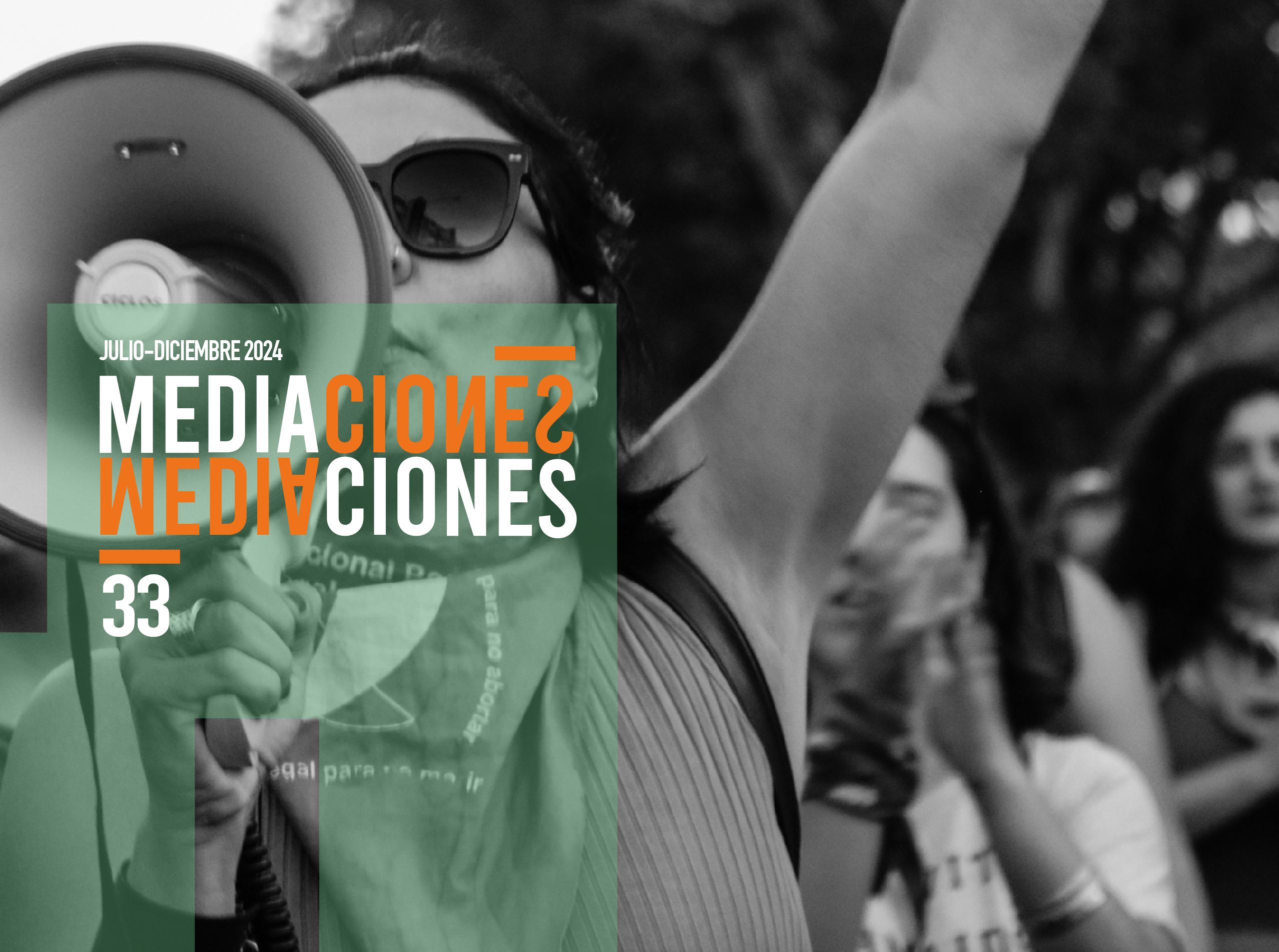Más allá de las heridas de la caída: Explorando nuevas posiciones de la Comunicación para el Cambio Social a través de disrupciones disciplinares
Barra lateral del artículo

##plugins.themes.bootstrap3.displayStats.downloads##
Cómo citar
Altmetrics
Detalles del artículo

Esta obra está bajo una licencia internacional Creative Commons Atribución 4.0.
![]()
Revista MEDIACIONES © 2024 por Corporación Universitaria Minuto de Dios - UNIMINUTO está licenciada bajo Creative Commons BY.
Contenido principal del artículo
Resumen
Este artículo explora perspectivas epistemológicas alternativas en el contexto de la Comunicación para el Cambio Social (CfCS), basándose en los hallazgos de una investigación etnográfica sobre la práctica del 'Teatro del Oprimido' de Jana Sanskriti en Bengala Occidental, India. Desafía los enfoques convencionales del desarrollo y la justicia social, alineándose con las ideas radicales propuestas por académicos como Boaventura de Sousa Santos (2014) y Avijit Pathak (1998). El artículo aboga por un alejamiento de las posturas reactivas y propone un cambio epistemológico que fomente una comprensión holística del desarrollo y el cambio social. También destaca algunos aspectos pasados por alto en el campo de la comunicación para el cambio social, subrayando la necesidad de identificar y explorar los posibles puntos ciegos que han sido descuidados pero que desempeñan un papel significativo en los procesos de cambio social. El autor argumenta que sacar a la luz estos aspectos podría enriquecer considerablemente el campo, defendiendo la exploración de ideas no convencionales—como la integración de la espiritualidad con el conocimiento académico—que a menudo se ven restringidas por las normas académicas tradicionales. La discusión aboga por la creación de un espacio que trascienda el miedo a las descalificaciones normativas a través de ciertas disrupciones disciplinarias necesarias, y finalmente propone una nueva posición y papel para la CfCS en un movimiento de este tipo. Superando su rol convencional de apoyo y justificación en las prácticas de desarrollo y cambio social, este giro significa un salto radical y una emancipación para el propio campo. Tal enfoque radical se alinea con el impulso contemporáneo por la justicia social a través de la justicia cognitiva.
Referencias
Abbas, J. (2015). Forum theatre in Bengal. Jana Sanskriti.
Bicchieri, C. (2017). Norms in the Wild. Oxford University Press.
Boal, A. (1979). Theater of the oppressed. New York, NY: Urizen Books.
Brahma (2022). Love as praxis:Reflections from Theatre of the oppressed movement in Eastern India. In A.C. Suzina & T. Tufte (Eds.), Freire and the Perseverance of Hope: Exploring Communication and Social Change (pp. 107-112). Institute of Network Cultures.
De Sousa Santos, B. (2014) Epistemologies of the South. Paradigm Publishers.
Diemer, M. A., Rapa, L. J., Voight, A. M., & McWhirter, E. H. (2016). Critical Consciousness: A Developmental Approach to Addressing Marginalization and Oppression. Child Development Perspectives, 10(4), 216–221. https://doi.org/10.1111/cdep.12193
Dutta, M. J. (2011). Communicating Social change: Structure, culture, and agency. New York, NY: Routledge.
Freire, P. (1970). Pedagogy of the Oppressed. Herder & Herder
Fuller, S. (1988). Social Epistemology. Indiana University Press.
Manyozo, L. (2017). Communicating Development with Communities. Taylor & Francis.
Pathak, A. (1998). Indian Modernity - Contradictions, Paradoxes and Possibilities. Gyan Publishing house.
Putman, Daniel (2001). The Emotions of Courage. Journal of Social Philosophy. 32 (4): 463–470. doi:10.1111/0047-2786.00107
Snyder, C. R. (1994). The Psychology of Hope: You Can Get There from Here. Free Press.
Suzina, A. C., & Tufte, T. (Eds.). (2022). Freire and the Perseverance of Hope. Institute of Network Cultures.
Thomas, P., & Van de Fliert, E. (2015). Interrogating the theory and practice of communication for social change: The basis for a renewal. Houndmills, Basingstoke, Hampshire and New York, NY: Palgrave Macmillan.
Tufte, T. (2017). Communication and social change: A citizen perspective. Cambridge, UK and Malden, MA: Polity Press.
Artículos similares
- Giordano Alvarado-Silva, INTERFACES: sobre la imaginación poética y otros artificios del lenguaje , MEDIACIONES: Vol. 21 Núm. 34 (2025): Enero - Junio. COMUNICACIÓN Y PODER
- Joan Pedro-Carañana, Ángel Carrasco-Campos, Eliana Herrera-Huérfano, Pensar la paz desde la comunicación: Desde la cultura de paz de Johan Galtung hacia la justicia comunicativa , MEDIACIONES: Vol. 20 Núm. 32 (2024): Enero - Junio. COMUNICACIÓN, PAZ Y CIUDADANIAS
- Amparo Cadavid, Cicilia Krohling Peruzzo, Thomas Tufte, Reimaginando la comunicación en la creación de mundos , MEDIACIONES: Vol. 20 Núm. 33 (2024): Julio - Diciembre. COMUNICACIÓN Y CAMBIO SOCIAL
- Rosalba Mancinas-Chávez, Lucía Varela Monterroso, Juan Miguel Orta Vélez, Configuración del poder global en la era digital. Actualización del panorama de los conglomerados mundiales de la comunicación , MEDIACIONES: Vol. 21 Núm. 34 (2025): Enero - Junio. COMUNICACIÓN Y PODER
- Susana Gema Alés Álvarez, Estructura de la información en la comunicación alternativa. El caso de El Salto , MEDIACIONES: Vol. 21 Núm. 34 (2025): Enero - Junio. COMUNICACIÓN Y PODER
- Gabriela Nelida Lucero, Fotografía para el cambio social , MEDIACIONES: Vol. 20 Núm. 33 (2024): Julio - Diciembre. COMUNICACIÓN Y CAMBIO SOCIAL
- Julieti Sussi de Oliveira, Tendencias en las políticas culturales locales en el siglo XXI: Un análisis comparativo entre España y Brasil , MEDIACIONES: Vol. 21 Núm. 34 (2025): Enero - Junio. COMUNICACIÓN Y PODER
- Sonia Isabel Duque Pérez, “Realidad” como Problema y “Realidad” como Solución Convergencias y Divergencias: Aproximación Reflexiva a la Comunicación y el Poder desde la Agenda Setting , MEDIACIONES: Vol. 21 Núm. 34 (2025): Enero - Junio. COMUNICACIÓN Y PODER
- Karina M. Herrera Miller, Comunicación y cambio social: territorios de sentido en disputa , MEDIACIONES: Vol. 20 Núm. 33 (2024): Julio - Diciembre. COMUNICACIÓN Y CAMBIO SOCIAL
- Ana Fernández-Viso, Cuestionar y enfrentar el edadismo hacia las personas mayores desde la comunicación: el caso del movimiento asociativo de las personas mayores en El Salvador , MEDIACIONES: Vol. 20 Núm. 33 (2024): Julio - Diciembre. COMUNICACIÓN Y CAMBIO SOCIAL
También puede Iniciar una búsqueda de similitud avanzada para este artículo.




